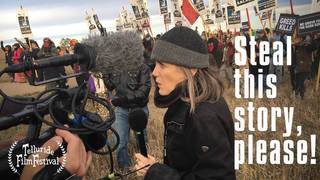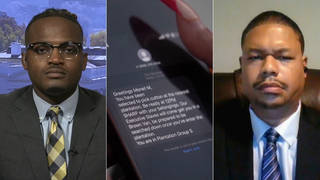
Topics
Guests
- Ari Bermanauthor of the new book, Give Us the Ballot: The Modern Struggle for Voting Rights in America. He covers voting rights for The Nation.
This week marks the 50th anniversary of a landmark achievement of the civil rights movement. It was August 6, 1965, when President Lyndon Johnson signed into law the Voting Rights Act, as Rev. Martin Luther King Jr., Rosa Parks and now 14-term Congressman John Lewis looked on. The law has been under constant attack ever since. Just two years ago, the Supreme Court struck down parts of the measure in a case called Shelby County, Alabama v. Holder when it ruled states with histories of voting-related racial discrimination no longer had to “pre-clear” changes to their voting laws with the federal government. One month later, North Carolina passed sweeping voting restrictions that cut early voting and eliminated same-day registration. During the midterm elections in 2014, these new rules prevented thousands from casting their vote. We speak to Ari Berman, author of the new book, “Give Us the Ballot: The Modern Struggle for Voting Rights in America.”
Transcript
AMY GOODMAN: “We Shall Not Be Moved,” recorded by amateur audio documentarian Carl Benkert, who made recordings of the third March on Selma. Benkert wrote of the experience, “music was an essential element; music in song expressing hope and sorrow; music to pacify or excite; music with the power to engage the intelligence and even touch the spirit.” This is Democracy Now!, democracynow.org, The War and Peace Report. I’m Amy Goodman, with Juan González.
JUAN GONZÁLEZ: Well, as the Republicans prepare to hold the first presidential debate of the 2016 race, the media are focusing largely on which candidates will be heard. On Tuesday, Fox News announced Republican Governors Chris Christie and John Kasich had grabbed the last spots in Thursday’s 10-candidate debate. Fox News said it calculated its top 10 list by averaging five national polls, a process which came under fire from polling agencies earlier this week.
Well, today, we look at who will be able to vote in the upcoming election. This week marks the 50th anniversary of a landmark achievement of the civil rights movement. It was on August 6, 1965, when President Lyndon Johnson signed into law the Voting Rights Act, as Reverend Martin Luther King, Rosa Parks and now 14-term Congressman John Lewis looked on. This is an excerpt from Johnson’s address to Congress that day.
PRESIDENT LYNDON JOHNSON: This act flows from a clear and simple wrong. Its only purpose is to right that wrong. Millions of Americans are denied the right to vote because of their color. This law will ensure them the right to vote. The wrong is one which no American in his heart can justify. The right is one which no American true to our principles can deny.
JUAN GONZÁLEZ: That was President Lyndon Johnson speaking 50 years ago on August 6, 1965, just before he signed the Voting Rights Act into law. The law has been under constant attack ever since. Just two years ago, the Supreme Court struck down parts of the measure in a case called Shelby County, Alabama v. Holder when it ruled that states with histories of voting-related racial discrimination no longer had to “pre-clear” changes to their voting laws with the federal government. One month later, North Carolina passed sweeping voting restrictions that cut early voting and eliminated same-day registration. During the midterm elections in 2014, these new rules prevented thousands from casting their vote.
AMY GOODMAN: Voting rights could become a pivotal issue in the 2016 race. On Tuesday, former Maryland Governor Martin O’Malley, who’s running for the Democratic presidential nomination, called for a constitutional amendment to protect every American’s right to vote. Meanwhile, California announced Tuesday it’s dropping its challenge to a court ruling allowing thousands of newly released felons to vote. The move effectively extends voting rights to 60,000 to 73,000 former prisoners.
Well, for more, we go to Ari Berman. He covers voting rights for The Nation, and his new, exhaustive new book has just been published. It’s called Give Us the Ballot: The Modern Struggle for Voting Rights in America.
Welcome back to Democracy Now! It’s great to see you again, Ari.
ARI BERMAN: Great to see you again, too. Thank you.
AMY GOODMAN: I saw you in Selma, where you begin your book—
ARI BERMAN: Yeah.
AMY GOODMAN: —on the 50th anniversary of the 1965—
ARI BERMAN: Yes.
AMY GOODMAN: —first Selma march, where John Lewis was front and center this time, introducing the first African-American president, as he said, to his own shock.
ARI BERMAN: Yeah, it was an amazing moment to see John Lewis, who nearly died in Selma 50 years earlier, introducing Barack Obama, hugging him on stage, and basically Lewis saying, “I never thought I would see this day,” and the president saying, “I never thought I would see this day, either.” It was very emotional to be there. And I was glad that I was there, because I really wanted to get that moment into my book. And I snuck it in. It was basically the last thing I was able to add.
And, you know, then history comes full circle, of course, because they’re in Selma celebrating the Voting Rights Act, but the Voting Rights Act has also been gutted. So the same thing they fought for, 50 years later, was now under siege. And that gave some real tension to the anniversary of Bloody Sunday. It wasn’t just a commemoration; it was really a call to recognize the importance of the Voting Rights Act and to restore it going forward.
JUAN GONZÁLEZ: Well, for—a lot of people nowadays take voting for granted, and they have no knowledge of this history.
ARI BERMAN: Yeah.
JUAN GONZÁLEZ: But you—in your early chapters, you talk about it as being the second Emancipation and then the second Reconstruction.
ARI BERMAN: Yeah.
JUAN GONZÁLEZ: Could you—those analogies, why you use those analogies, and could you go through some of that early battle?
ARI BERMAN: Absolutely. Well, the second Emancipation and the second Reconstruction is what’s so important to remember, because in 1870 we passed the 15th Amendment, that said the right to vote “shall not be denied or abridged on the basis of race, color or previous condition of servitude.” Then we essentially ignored the 15th Amendment for almost 95 years. Reconstruction, when there was a flourishing of black political power in the South, lasted for basically a decade after federal troops pulled out of the South as a result of the disputed 1876 election. States like Mississippi and Alabama started passing things like poll taxes, literacy tests to disenfranchise black voters. And so, what you saw is, after the Civil War, an explosion of black political power, basically followed by the total absence of black political power just a decade later. And so, the Voting Rights Act of 1965 essentially was passed just to enforce the 15th Amendment, which we shouldn’t have needed to enforce in the first place, because it was already on the books. And so, what the Congress and what President Johnson did with the Voting Rights Act was make sure that we didn’t have to have a third Reconstruction, a third Emancipation, that we would solve this problem of voting discrimination once and for all.
AMY GOODMAN: I wanted to go back to Dr. Martin Luther King speaking in Washington, D.C., on May 17th, 1957, his speech, “Give Us the Ballot.”
REV. MARTIN LUTHER KING JR.: Give us the ballot, and we will fill our legislative halls with men of goodwill and send to the sacred halls of Congress men who will not sign a Southern manifesto because of their devotion to the manifesto of justice. Give us the ballot, and we will place judges on the benches of the South who will do justly and love mercy, and we will place at the head of the Southern states governors who will—who have felt not only the tang of the human, but the glow of the divine. Give us the ballot, and we will quietly and nonviolently, without rancor or bitterness, implement the Supreme Court’s decision of May 17th, 1954.
AMY GOODMAN: That was Dr. Martin Luther King, May 17th, 1957, in his speech, “Give Us the Ballot.” Ari Berman, where are we today?
ARI BERMAN: Well, we’re in a, I think, very disturbing and ironic position, where we’re celebrating the 50th anniversary of the Voting Rights Act, but the Voting Rights Act has been gutted, and there’s been a much broader attack on voting rights. So, from 2011 to 2015, 468 new voting restrictions have been introduced in 49 states. So this is a battle that’s taking place all across the country to try to make it harder to vote. Half the states in the country have passed new laws making it harder to vote since 2010. So that was the backdrop to the Supreme Court’s decision that gutted the Voting Rights Act and allowed those states with the worst histories of voting discrimination, places like Alabama, Texas, Mississippi, to no longer have to approve their voting changes with the federal government. So, people—voters are being hit from all sides here. They’re being hit by new voting restrictions making it harder for young people, minorities, women to be able to vote, and they’re also being hit by a Supreme Court that gutted the Voting Rights Act, ironically, at the very moment when the Voting Rights Act was needed so much, after all these new voting restrictions had been passed.
JUAN GONZÁLEZ: In one chapter, chapter eight, you begin your story with Willie Steen, a Navy veteran of the Persian Gulf War, who was attempting to vote in the 2000 election in his hometown in Tampa, Florida. Could you talk about his situation and also the importance of the Florida election and then the Supreme Court Bush-Gore decision on that? I want to turn to comments made by Justice Antonin Scalia during oral arguments in Shelby v. Holder. He suggested certain provisions of the Voting Rights Act were a form of, quote, “racial entitlement.”
JUSTICE ANTONIN SCALIA: I think it is attributable, very likely attributable, to a phenomenon that is called a perpetuation of racial entitlement. It’s been written about. Whenever a society adopts racial entitlements, it is very difficult to get out of them through the normal political processes.
JUAN GONZÁLEZ: Yeah, that was Justice Scalia. But we do actually have a video having to do with Willie Steen. I want to turn to investigative reporter Greg Palast, one of the leading journalists to expose voter disenfranchisement in Florida during the 2000 election. This is an excerpt of the film Bush Family Fortune.
GREG PALAST: Thousands of black voters, when they showed up to vote, were turned away because they were listed on voter registers as convicted criminals. But were they? I met with Willie Steen. Like 94,000 others, he had been tagged a criminal. He was not allowed to vote in Florida because Jeb’s elections officials said he was a felon. So, Willie, fess up. Are you a criminal?
WILLIE STEEN: No, no criminal at all. Never been convicted of any crime.
GREG PALAST: But they had you down as a felon.
WILLIE STEEN: Yes, they did. But not me. Wrong person. I never been arrested in my life. You know? Was in the military for four years, got out of the military, been in the medical field ever since. I mean, you can’t even work for a hospital being a convicted felon. And I was in the Persian Gulf War in '91, fought in the war. So, you know, it's pretty screwed up how they did me, but what can I say?
JUAN GONZÁLEZ: That was Willie Steen, who I was referring to earlier.












Media Options